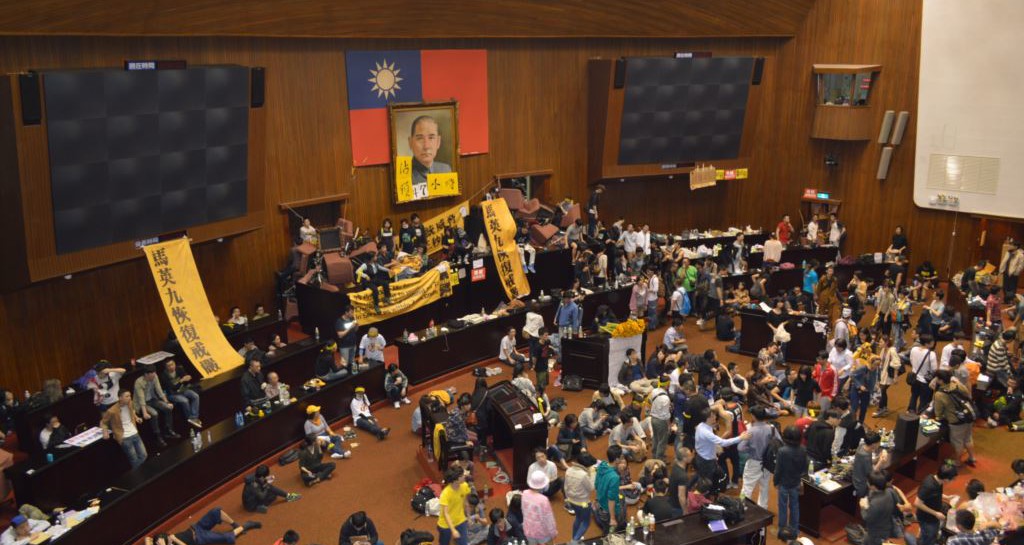On March 17, the Taiwanese government announced that it was ready to ratify the Cross-Strait Service Trade Agreement (CSSTA) with China. The agreement, which was signed in June 2013 but is still pending ratification, would allow China and Taiwan to invest in each other’s service markets. Even though Taiwan’s President Ma Ying-jeou has declared that the treaty would increase investment in Taiwan and create more jobs for the youth, the recent events on the island indicate that many disagree with him.
On March 18, several Taiwanese law students began protesting the treaty in front of the President’s offices in Taipei. When violent clashes with the police broke out later that day, students publicized the events through social media, resulting on several thousand civilians joining their cause. From that point on, about 100,000 people participated on the occupation of the Legislative Yuan (Council), an encampment that lasted until April 10. The Sunflower Movement, as it is referred to by the media, argues that a greater economic integration with China would give the mainland too much influence over Taiwan. For this reason, the Sunflower Movement has been calling for the cancellation of the agreement, and for increased transparency in the Taiwanese efforts to improve its relationships with China.
The concerns regarding Taiwan losing autonomy over China are not new: the historical friction between the two territories goes back to the end of the Chinese Civil War in 1949, when the Nationalists had to retreat from mainland China to Taiwan. Since then, the relationship between the two entities has been ruled by their disputes over the independence status of the Republic of China, as well as their mutual recognition as legitimate governments. More recently, however, the Taiwanese administration has been more receptive to the idea of improving its relationship with the mainland, and earlier this year Taiwan and China held direct government-to-government talks for the first time.
The interests for Taiwan to improve its bonds with China are not surprising either. After all, Taiwan’s biggest trading partner is indeed China. Moreover, because of its remarkable economic growth, Taiwanese investors find Chinese markets very attractive. In fact, the increasing emigration of Taiwanese residents to Shanghai, suggests that civilians saw the economic charm of China long before the Taiwanese government did. Hence, considering these reasons, the CSSTA proposal would seem like a beneficial initiative for Taiwan’s economy.
The rejection of a treaty that (at least at first glance) would result in mutual benefit for Taiwan and China makes it very clear that the problem is not economic; it is a question of autonomy and independence. The concerns that this treaty would leave Taiwan vulnerable to Chinese pressure are understandable: The reunification of Taiwan to the rest of China has always been part of the Beijing government’s discourse. Taiwan must be cautious about maintaining its autonomy when dealing with Beijing.
That being said, the rejection of the treaty and the overall Sunflower Movement seems incomplete at best. The cancellation of the agreement does not imply that Taiwan can keep ignoring the importance that China has upon its political and economic life. It also does not mean that Taiwanese investors will join the nationalist movement and avoid the Chinese markets: the scrapping of the agreement will only result in more Taiwanese emigration to Chinese cities, which simultaneously means less capital in Taiwan.
The Sunflower Movement has effectively shown Beijing that the Taiwanese mistrust should not be taken lightly. If Beijing desires to strengthen its relationship with the ROC, it will need to find means to convince the Taiwanese that the island’s autonomy will be respected. However, the Sunflower Movement also represents a problem for Taiwan: It seems to create the illusion that Taiwan does not need China in its economic life. The reality is that Taiwan should keep working to improve its relations with China. Instead of dismissing this fact, Taiwan should focus more on maintaining its autonomous status while negotiating with Beijing.
For now, Wang Jin-Pying, the head of the Legislative Yuan, has promised to establish a supervision act that will bring more transparency to trade agreements with Mainland China. It also proposed to carry out a clause-by-clause revision of the CSSTA. In light of these events, the Sunflower Movement handed the Legislative Yuan back to the government on April 10. Only time will show how much impact the movement really has upon Taiwanese-Chinese relations.
